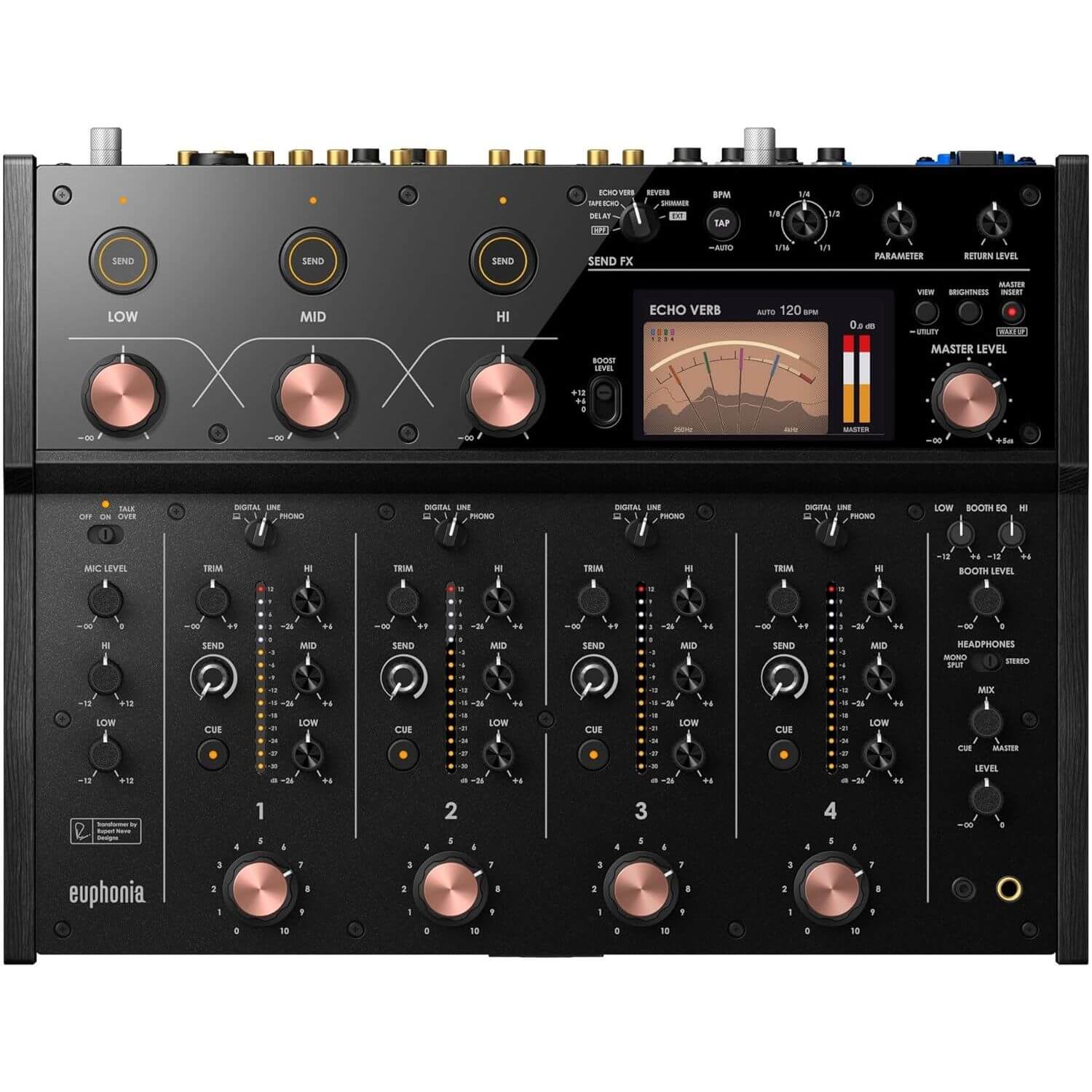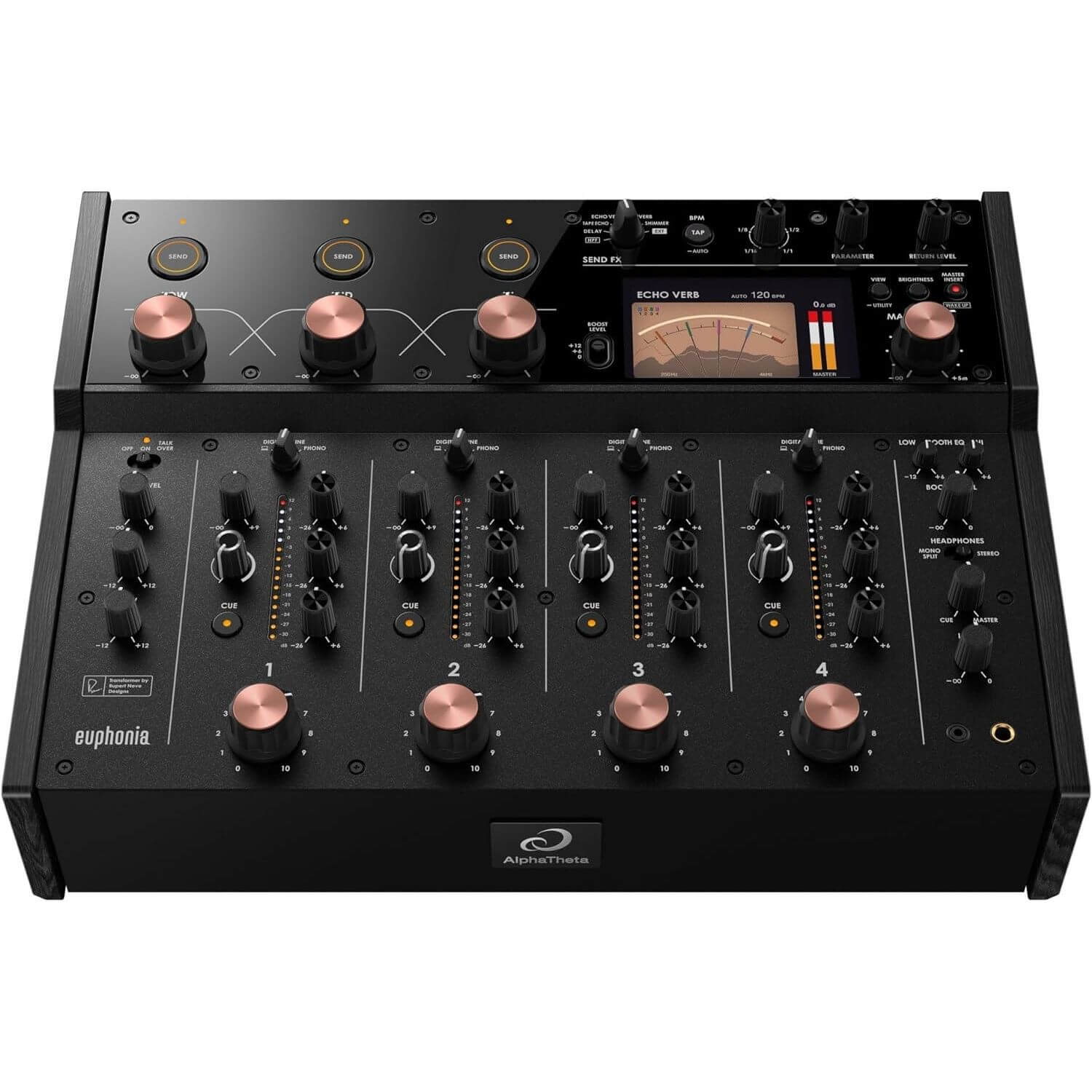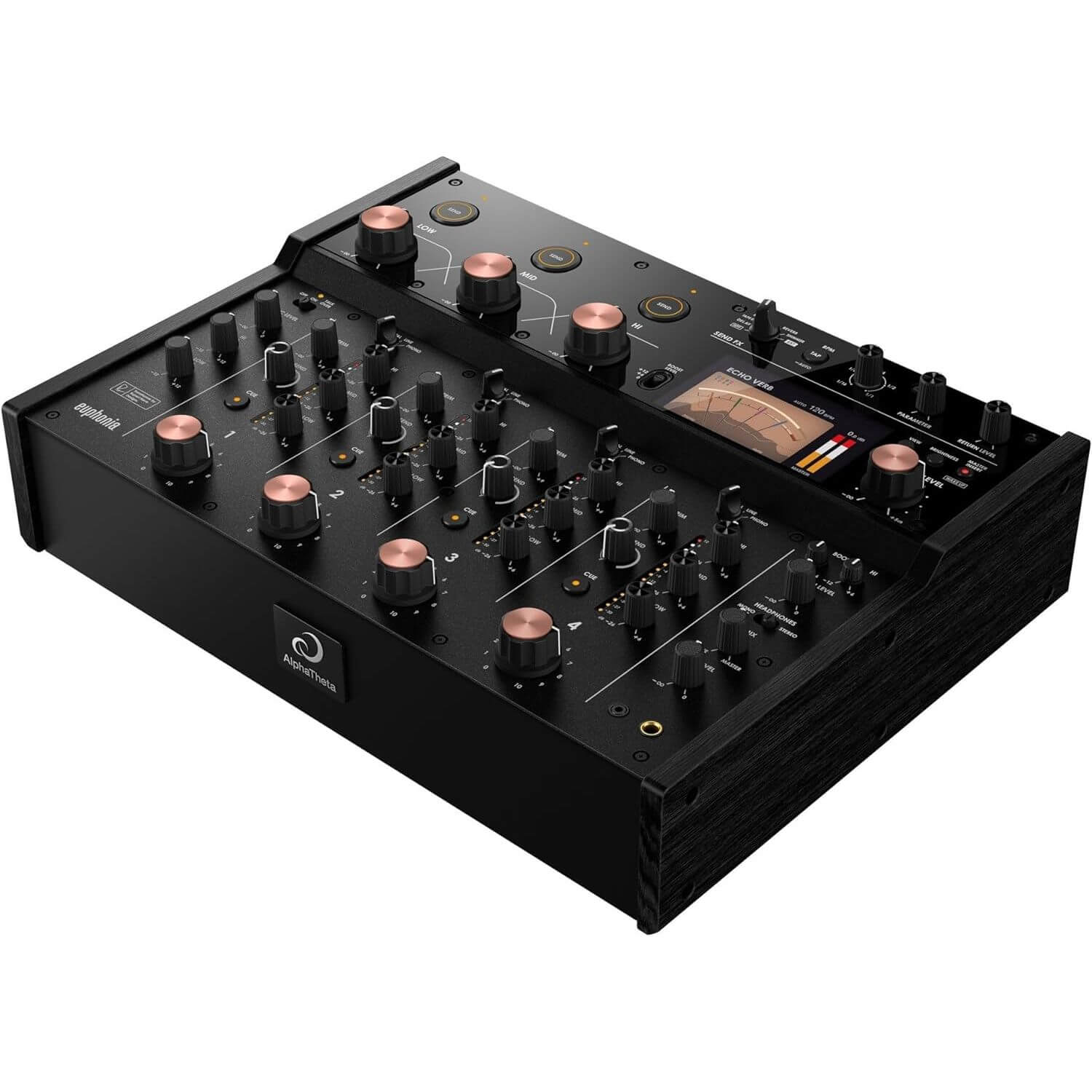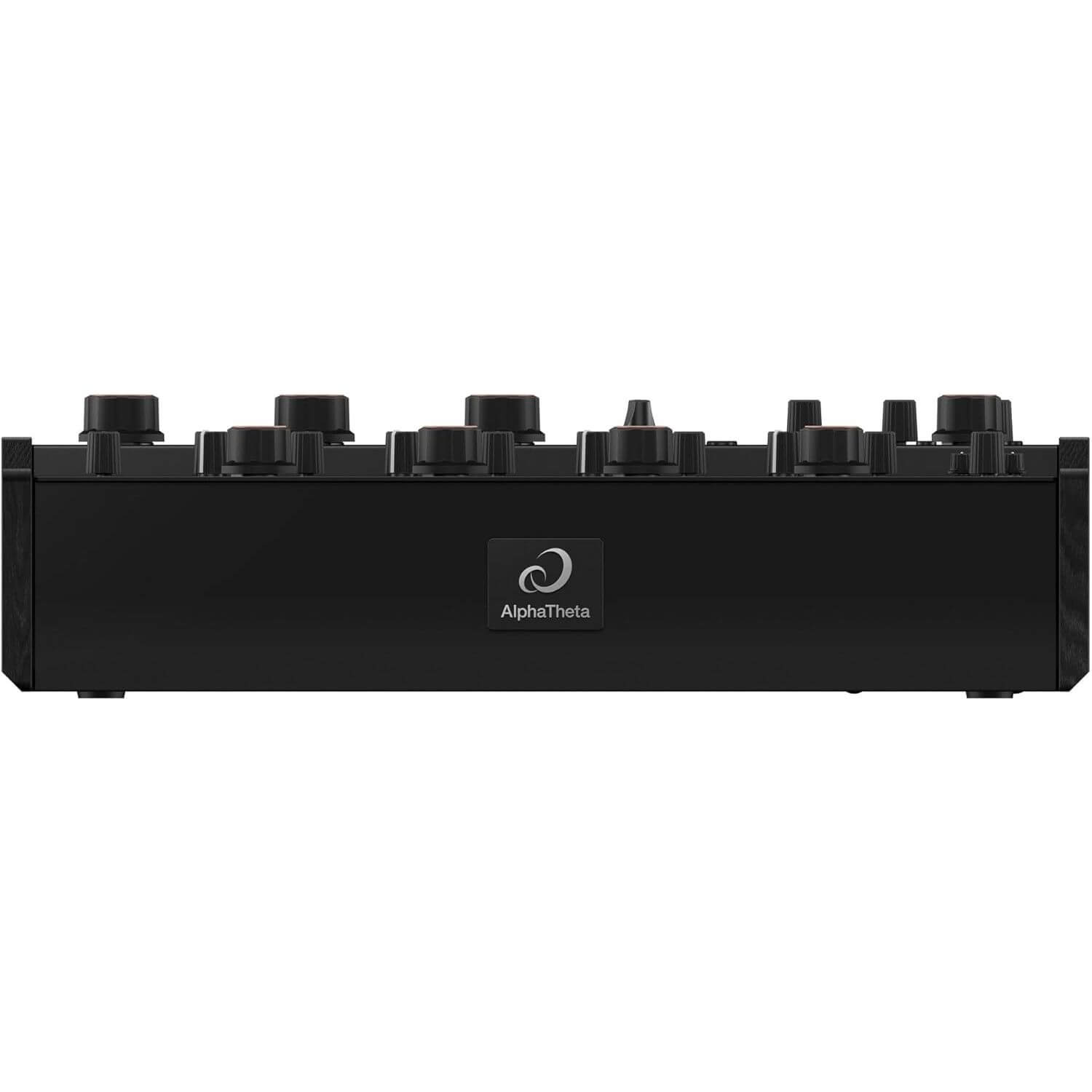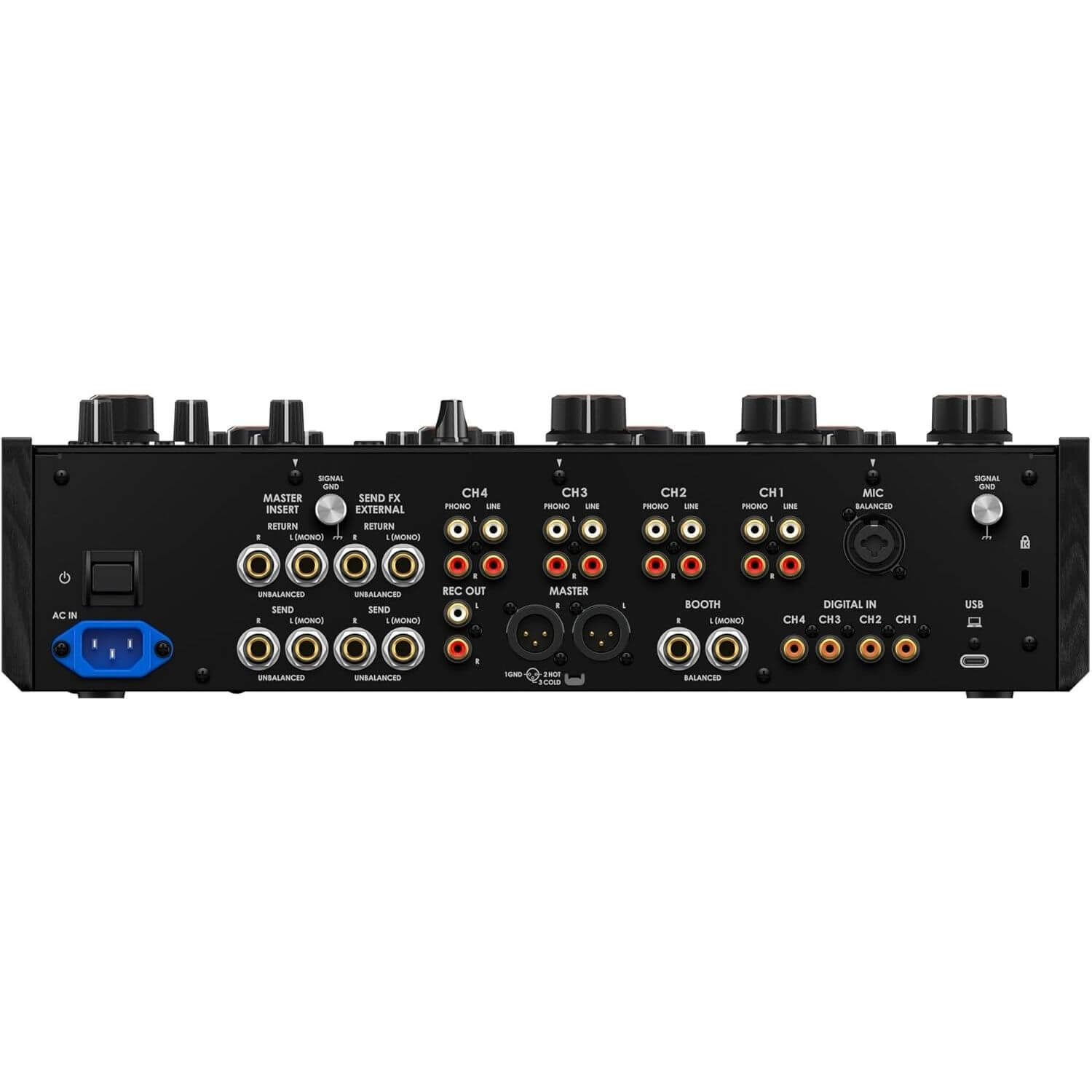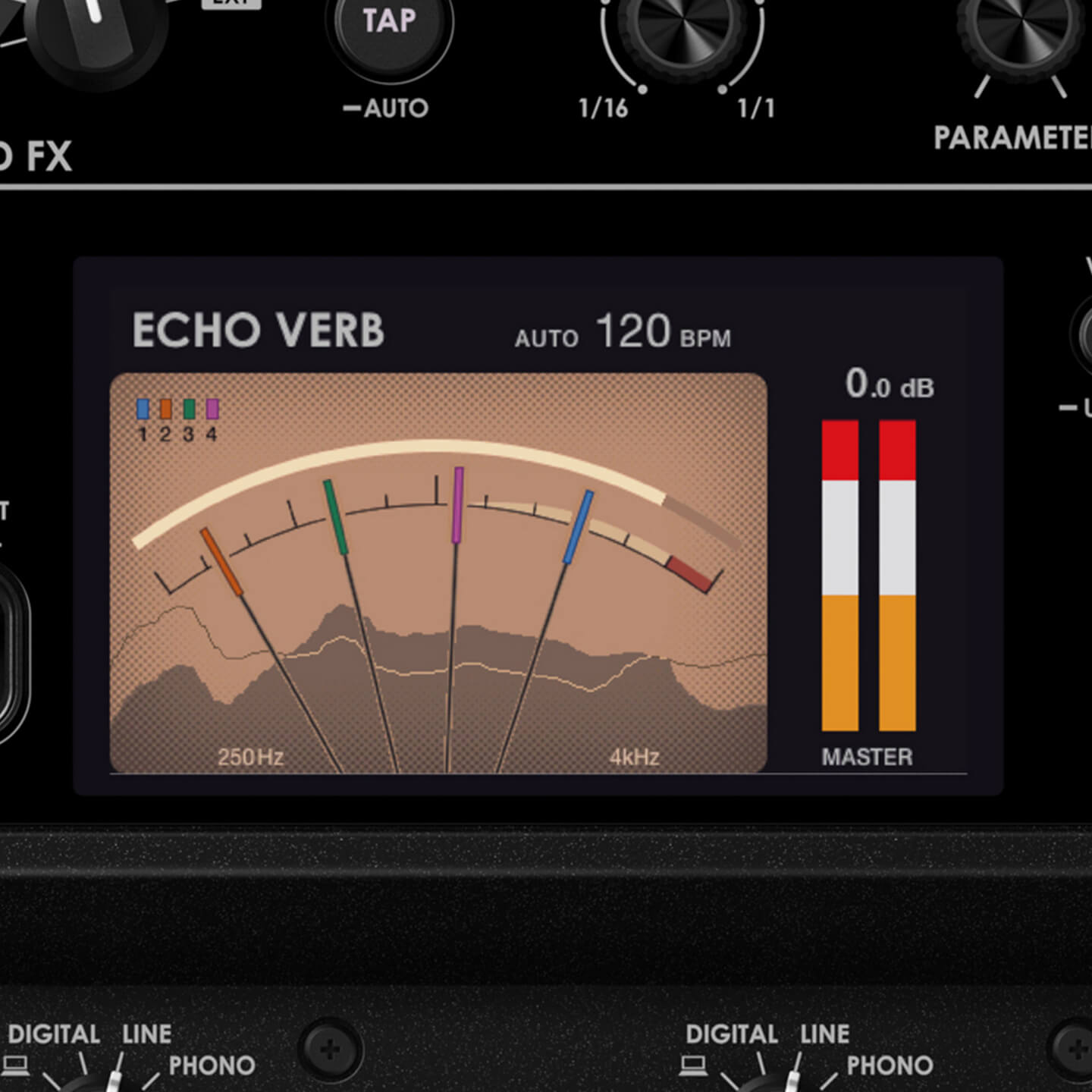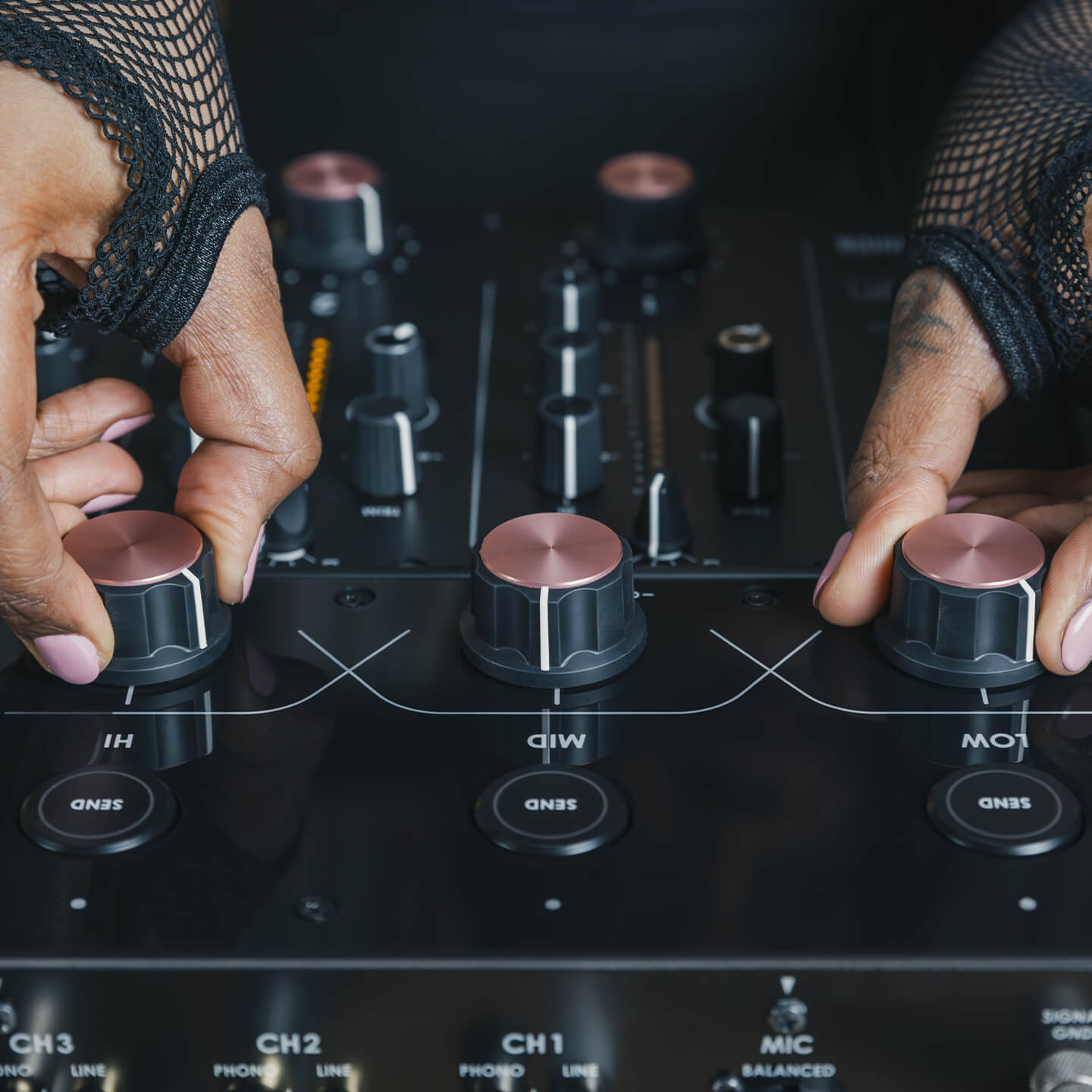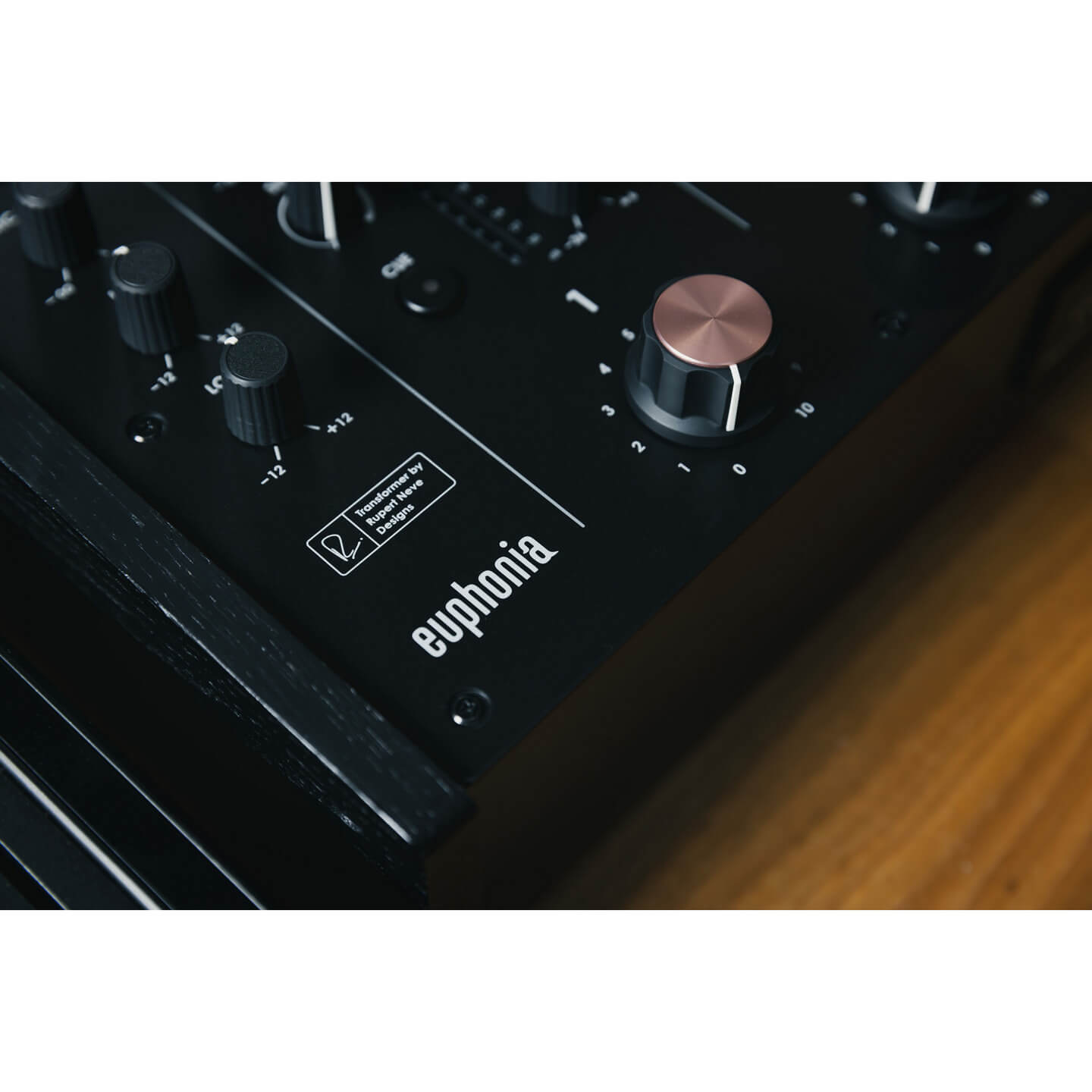We will notify you as soon as the product is in stock in our warehouse! The orders will be placed in priority order and we do not guarantee that the price will remain the same.
-
36 Instalments
-
 2 Years Warranty
2 Years Warranty
-
36 Instalments
-
 2 Years Warranty
2 Years Warranty


Read our buyer's guide for Προϊόντα DJ
Historic Mixing Meets Cutting-edge Performance Power
AlphaTheta’s Euphonia distills these decades of hallmark designs and turntable history into a 4-channel rotary mixer that has Sweetwater’s DJs inspired and delighted by AlphaTheta’s unwavering craftsmanship, merging heritage interfacing with state-of-the-art 32-bit A/D and D/A converters, next-gen rotary faders, and a cutting-edge transformer circuit co-developed with Rupert Neve Designs. Because it was custom-built and tuned for Euphonia, the RND transformer introduces a detailed veneer of shimmering harmonics and an energetic polish to give your seamless mixing even greater panache. Its comprehensive suite of per-channel equalization, a 3-band master-channel Isolator, and onboard effects are supplemented by innovative performance tools, multiple FX sends, and multimode compatibility that lets you enjoy Euphonia’s distinctive sonic character with Serato and rekordbox, in addition to classic vinyl. With an armature of output options and contemporary, reactive tactility, AlphaTheta’s Euphonia is unmatched in its modular mixing capabilities — it elevates any DJ setup with an ode to the hi-fi history that started it all.
Precision, detail, and state-of-the-art tactility
Euphonia effortlessly bridges the iconic characteristics of analog output with the precision and clarity of the digital domain, resulting in a first-of-its-kind mixer that combines 32-bit A/D and D/A converters with 96kHz/64-bit floating-point DSP for rich, unrivaled sonic depth. Getting hands-on to seize your sound has never been so inspiring, thanks to AlphaTheta’s custom-developed knob designs. Following extensive testing and experimentation, Euphonia’s control points were coated in elastomer to eliminate nearly all vibration while maximizing both comfort and grip to ensure reliable, detailed control and satisfying tactility. What’s more, these knobs feature a dynamic architecture that alters its behavior to match the weight applied to the rotary motion, meaning slower rotations are mechanically weighted to allow for ultra-fine resolution in your long-blend mixes. Meanwhile, faster rotations match the speed of your movement to support laser-focused, evocative expression in your performances.
Dynamic, one-handed FX and innovative Isolator design
One of the rotary mixer’s historic staples is its isolator, and AlphaTheta honors that hallmark performance appointment by outfitting Euphonia with a masterclass in isolator design. Its 3-band design attenuates the levels of each respective register, allowing you to selectively boost or cut the frequency band of the entire output to provide an additional dimension of mixing possibilities. But why stop there? Euphonia features a suite of five onboard spatialization effects — delay, tape echo, echo verb, reverb, and shimmer — that is accompanied by a highpass filter and an external option to use Send FX. When an effect is present, activating the Isolator’s “Send” button allows you to apply your effect to that band, proportionately saturating with continued clockwise rotation. Plus, you’ve got up to 12 decibels of boost available to instantly bolster the FX send, ensuring stable levels throughout your carefully concocted transition. With one-handed control for applying an effect as you adjust the Isolator band, you can conjure inventive mixing opportunities across Euphonia’s 4-channel array, thanks to that free hand.
Comprehensive interfacing to play your way
Paying homage to the earliest days of DJing, AlphaTheta has equipped Euphonia with a laundry list of comprehensive controls to guarantee complete coherence with your sonic vision. Each channel includes a Trim control, level meter, 3-band EQ, Cue designation, and Send knob, alongside a 4-point input selector that lets you mix and match Phono, Line, Digital, or computer sound sources. A dedicated 2-band EQ and Level knob provides additional control over your Booth output, while headphone playback can be toggled between standard stereo and a mono split. For DJs using in-ear monitors, this second option — known as “split cueing” — allows your cued and master output to play in mono to each respective ear. When it comes to monitoring your mix, Euphonia’s vivid display serves as a multimode source of real-time feedback, offering conventional VU-meter readings, as well as a spectral analyzer to get a granular look at your sound’s behavior. They’ve even color-coded each channel to give you a comprehensive visualization of the whole mix, illustrating how the frequency bands of each channel interact with one another.
Complete connectivity with rekordbox, Serato, and more
Between Euphonia’s onboard 32-bit A/D and D/A converters and the 96kHz/64-bit floating-point DSP that AlphaTheta’s been refining for years, no effort was spared to ensure Euphonia preserves every nuance of your tracks. Masterfully threading the needle between digital and analog, DJs of any style — new- or old-school — can utilize Euphonia’s suite of sound-shaping tools. Phono and Line input pairs are available for each channel, in addition to four digital inputs, two signal ground contacts, and a USB-C port to connect your laptop and take advantage of Euphonia’s onboard support for rekordbox and Serato if vinyl records aren’t your speed. Stereo pairs for your Master output, your Booth output, and a dedicated recording output are offered in XLR, TRS, and RCA terminals, respectively. The Recording output can be used with supplementary gear, like a power amp. Toss in the fact that Euphonia’s suite of Send FX- and Master Insert-pairs lets you incorporate virtually any external audio processing into your setup, and you can rest assured knowing that AlphaTheta’s primed Euphonia for electrifying performances.
From Studio 54 to contemporary hi-fi: a (very) brief history
During the disco deluge of the 1970s, DJing was born out of a collective desire to engage with music and the culture around it, bringing people together. Rotary mixers comprised the first commercial club mixers to emerge, populating the likes of Paradise Garage and other legendary nightlife venues, preferred for the hands-on tactility of the rotary fader’s detailed, precise control, alongside the use of components necessary for hi-fi audio preservation. When the infamous Disco Demolition Night of 1979 led to a riot during the Chicago field’s double-header between the White Sox and the Detroit Tigers, it would herald the end of disco’s reign as the preeminent force of popular music. This same period would mark a dramatic series of technological advancements that revolutionized how we write, record, and produce music, leading to a proliferation of partly or fully digital instrumentation, breaking down many boundaries around who a given instrument or tool was “for.” Disco’s demise meant that dance music would return to the underground, as burgeoning iterations of hip-hop, techno, groove, and boogie genres capitalized on the newer, cheaper tech. This influence was felt with DJs, too, as mixers traded rotary faders for the more affordable, more malleable sliders — the first domino to fall as mixing, scratching, back-queueing, and beat-juggling techniques would evolve, increasing in complexity as DJs challenged performance conventions. Decades would pass before the 2010s would see a resurgence in the popularity of rotary mixers, which have now become commonplace at clubs, listening bars, and the homes of audiophiles around the world, all of which laud the rotary mixer for its hi-fi architecture, the creative potential of the Isolator circuit, and detailed, high-resolution control that rotary faders uniquely enable. Studio 54 may be no more, but AlphaTheta’s proudly staked out their space in the rotary resurgence, propping up Euphonia as a flagship execution of the historic mixing technology that’s been with DJs and turntablists from the beginning.
AlphaTheta Euphonia 4-channel Rotary Mixer Features:
- 4-channel rotary mixer provides exceptional control over your mix, supporting precise adjustments perfect for longer blends and transitions
- Rupert Neve Designs co-developed Euphonia’s transformer circuitry to ensure unmatched aural integrity while supplying rich harmonics and a high-energy, crystalline veneer for smooth mixes
- 32-bit A/D and D/A converters are coupled with 96kHz/64-bit floating-point DSP, providing impeccable processing for uncompromising use with any style of DJing
- Master Isolator gives you precise, creatively flexible 3-band control over your master output to give you an additional dimension of mixing possibilities
- Send button lets you apply internal or external FX to each respective Isolator band individually, further augmenting creative opportunities in your set
- Robust spatialization FX include individuated parameters so you can dial in the perfect blend of sound and texture
- Continuous BPM subdivision and tap tempo mean FX can be deployed in synchronized and offset capacities to give you complete control of your sonic textures
- Vivid Energy Visualizer display includes in-depth, real-time feedback to simultaneously monitor all 4 color-coded channels
- Extensive testing and revising to determine knob size and coating material makes for reliable, nuanced control with a satisfying tactility
- Custom-designed knob mechanisms allow adjustments to occur in proportion to the weight applied to rotating the knobs for exacting precision at any rotational speed
- Per-channel 3-band EQ, level display, Cue assignments, FX Send, and Trim let you refine each channel with unrivaled specificity to suit your style
- Selectable split-cue headphone output means mono playback for cued and master output in each ear to support multitudes of DJ performances and in-ear monitors
- Comprehensive connectivity suite includes multiple analog, digital, balanced, unbalanced, and Send options to accommodate countless mixing and FX configurations
- USB-C port lets you use Euphonia with supplementary software, with onboard support for rekordbox and Serato
Complete connectivity with rekordbox, Serato, and more
Between Euphonia’s onboard 32-bit A/D and D/A converters and the 96kHz/64-bit floating-point DSP that AlphaTheta’s been refining for years, no effort was spared to ensure Euphonia preserves every nuance of your tracks. Masterfully threading the needle between digital and analog, DJs of any style — new- or old-school — can utilize Euphonia’s suite of sound-shaping tools. Phono and Line input pairs are available for each channel, in addition to four digital inputs, two signal ground contacts, and a USB-C port to connect your laptop and take advantage of Euphonia’s onboard support for rekordbox and Serato if vinyl records aren’t your speed. Stereo pairs for your Master output, your Booth output, and a dedicated recording output are offered in XLR, TRS, and RCA terminals, respectively. The Recording output can be used with supplementary gear, like a power amp. Toss in the fact that Euphonia’s suite of Send FX- and Master Insert-pairs lets you incorporate virtually any external audio processing into your setup, and you can rest assured knowing that AlphaTheta’s primed Euphonia for electrifying performances.


Comprehensive interfacing to play your way
Paying homage to the earliest days of DJing, AlphaTheta has equipped Euphonia with a laundry list of comprehensive controls to guarantee complete coherence with your sonic vision. Each channel includes a Trim control, level meter, 3-band EQ, Cue designation, and Send knob, alongside a 4-point input selector that lets you mix and match Phono, Line, Digital, or computer sound sources. A dedicated 2-band EQ and Level knob provides additional control over your Booth output, while headphone playback can be toggled between standard stereo and a mono split. For DJs using in-ear monitors, this second option — known as “split cueing” — allows your cued and master output to play in mono to each respective ear. When it comes to monitoring your mix, Euphonia’s vivid display serves as a multimode source of real-time feedback, offering conventional VU-meter readings, as well as a spectral analyzer to get a granular look at your sound’s behavior. They’ve even color-coded each channel to give you a comprehensive visualization of the whole mix, illustrating how the frequency bands of each channel interact with one another.
Dynamic, one-handed FX and innovative Isolator design
One of the rotary mixer’s historic staples is its isolator, and AlphaTheta honors that hallmark performance appointment by outfitting Euphonia with a masterclass in isolator design. Its 3-band design attenuates the levels of each respective register, allowing you to selectively boost or cut the frequency band of the entire output to provide an additional dimension of mixing possibilities. But why stop there? Euphonia features a suite of five onboard spatialization effects — delay, tape echo, echo verb, reverb, and shimmer — that is accompanied by a highpass filter and an external option to use Send FX. When an effect is present, activating the Isolator’s “Send” button allows you to apply your effect to that band, proportionately saturating with continued clockwise rotation. Plus, you’ve got up to 12 decibels of boost available to instantly bolster the FX send, ensuring stable levels throughout your carefully concocted transition. With one-handed control for applying an effect as you adjust the Isolator band, you can conjure inventive mixing opportunities across Euphonia’s 4-channel array, thanks to that free hand.

- Max. external dimensions (WxD xH): 429 x 331 x 119mm
- Main unit weight: 9.5kg
- Frequency response: 20 Hz - 40 kHz (LINE)
- S/N Ratio: 107 dB (USB, DIGITAL IN), 88 dB (PHONO), 105 dB (LINE), 79 dB (MIC)
- Power requirements: AC 110 V - 240 V, 50 Hz / 60 Hz
- Power consumption: 43 W
- Accessories: Power cord, Quick start guide, Precautions for use
- Compatible software: rekordbox, Serato DJ Pro
- Inputs: DIGITAL IN x 4 (coaxial), LINE x 4 (RCA), PHONO x 4 (RCA), MIC x 1 (XLR & 1/4/" TRS jack)
- Outputs: MASTER x 1 (XLR), BOOTH x 1 (1/4/" TRS jack), REC x 1 (RCA), PHONES x 2 (1/4/" stereo phone jack, 3.5 mm stereo mini jack)
- USB: USB Type-C x 1
- Others: SEND x 2 (1/4/" TS jack), RETURN x 2 (1/4/" TS jack)
How would you rate this product?
Stock Notice






























